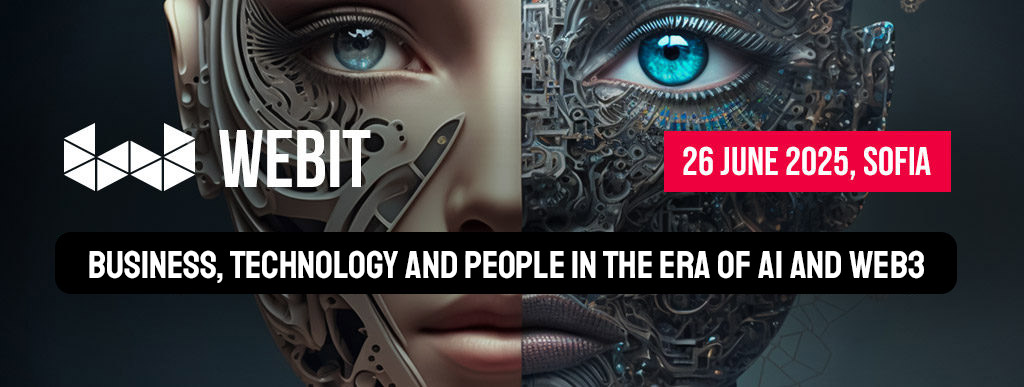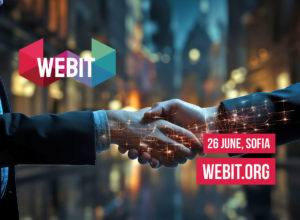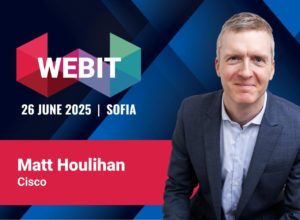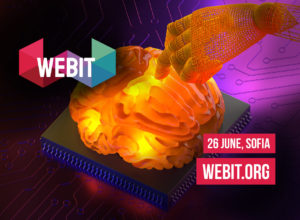Webit 2025: Where Technology, Business, and Human Potential Converge
Dimitar Berbatov to Deliver an Exclusive Masterclass at Webit 2025:
"Leadership and Success in the New Tech Era – My Way"
June 26, 2025 | National Palace of Culture, Sofia, Bulgaria
Sofia will once again become the epicenter of innovation and global dialogue as it hosts Webit 2025, the leading platform for innovation, AI, and Web3 in the region.
This year’s edition promises to be one of the most inspiring yet, featuring a special keynote Masterclass by Dimitar Berbatov – globally acclaimed Bulgarian football legend, thought leader, and author.
Titled “Leadership, Discipline & Success – My Way”, the Masterclass will take attendees on a motivational journey through the mindset, habits, and values that shape sustainable success – not only in sports, but in life and business. Drawing insights from his best-selling book, Berbatov will share how to cultivate a winner’s mentality, maintain self-discipline, and lead authentically from within.
This session is specially designed for business leaders, entrepreneurs, innovators, young professionals, and anyone striving to achieve long-term personal and professional growth.
 Webit 2025: Technology, Business & Humanity in the Age of AI and Web3
Under the theme “Business, Technology & People in the Era of AI and Web3,” Webit 2025 will convene world leaders, visionaries, and thousands of participants to explore how artificial intelligence, decentralized technologies, and purpose-driven leadership are reshaping industries, organizations, and society at large.
Webit is more than just a conference – it is a global movement where bold ideas, breakthrough technology, and the power of the human spirit come together to shape the future.
Key topics at Webit 2025 include:
Webit 2025: Technology, Business & Humanity in the Age of AI and Web3
Under the theme “Business, Technology & People in the Era of AI and Web3,” Webit 2025 will convene world leaders, visionaries, and thousands of participants to explore how artificial intelligence, decentralized technologies, and purpose-driven leadership are reshaping industries, organizations, and society at large.
Webit is more than just a conference – it is a global movement where bold ideas, breakthrough technology, and the power of the human spirit come together to shape the future.
Key topics at Webit 2025 include:
 Webit 2025: Technology, Business & Humanity in the Age of AI and Web3
Under the theme “Business, Technology & People in the Era of AI and Web3,” Webit 2025 will convene world leaders, visionaries, and thousands of participants to explore how artificial intelligence, decentralized technologies, and purpose-driven leadership are reshaping industries, organizations, and society at large.
Webit is more than just a conference – it is a global movement where bold ideas, breakthrough technology, and the power of the human spirit come together to shape the future.
Key topics at Webit 2025 include:
Webit 2025: Technology, Business & Humanity in the Age of AI and Web3
Under the theme “Business, Technology & People in the Era of AI and Web3,” Webit 2025 will convene world leaders, visionaries, and thousands of participants to explore how artificial intelligence, decentralized technologies, and purpose-driven leadership are reshaping industries, organizations, and society at large.
Webit is more than just a conference – it is a global movement where bold ideas, breakthrough technology, and the power of the human spirit come together to shape the future.
Key topics at Webit 2025 include:
- Human-AI collaboration: Building effective AI-powered teams
- AI-driven transformation in commerce and fintech
- AI in ERP/EPM systems for strategic planning and optimization
- Public-private partnerships for secure AI innovation and local economic growth
- AI agents as 24/7 digital colleagues in the workplace
- AI-powered marketing and hyper-personalization
- Intuitive design and UX in AI applications
- Education 3.0 and NFT-based learning models
- AI in personalized learning and cognitive flexibility development
- AI in healthcare and longevity technologies
- Cybersecurity in the age of intelligent threats
We’re excited to welcome Sven Peters, Atlassian, to Webit 2025 in...
For over 15 years, Sven has explored what makes high-performing teams tick — from cultural habits to cutting-edge tech practices.
At Atlassian, he champions modern working methods that boost collaboration, spark innovation, and reimagine how we work.
Through his engaging talks and hands-on experience, Sven empowers organisations to build thriving team cultures that are fit for the future.
He’s one of many inspiring voices you’ll hear at Webit — stay tuned for more speaker reveals!
🎟 The event is invitation-only, and just 50 tickets for industry leaders are available:
https://www.webit.org/2025/sofia/tickets.php
#Webit2025 #TeamCulture #FutureOfWork #Innovation #TechLeadership #Atlassian #ModernWork #WebitSpeakers
Shaping a Responsible AI Future for Business: Trust, Ethics, and...
As artificial intelligence (AI) becomes deeply woven into the fabric of modern business, its transformative potential is clearer than ever. From automating operations to enhancing customer experiences and accelerating strategic decisions, AI is unlocking new levels of productivity and innovation. But with great power comes great responsibility.
To ensure AI delivers long-term value, businesses must secure its future—not just in terms of infrastructure, but through a lens of trust, ethics, governance, and resilience.

The Trust Imperative
Trust is the currency of successful AI adoption. Whether it’s customers, employees, or stakeholders, people need to trust that AI systems are fair, transparent, and reliable.- Transparency: Businesses must be able to explain how AI systems arrive at decisions. This is especially important in high-impact areas such as finance, hiring, or healthcare.
- Accountability: Clear ownership and responsibility for AI systems must be established. Who monitors performance? Who intervenes when outcomes go wrong?
- Bias and Fairness: AI models learn from data, and data can carry bias. Businesses need robust processes to detect and mitigate algorithmic bias to avoid perpetuating inequality.
Building Resilient, Responsible AI
AI is not a "set it and forget it" tool. It's a living system that evolves, and must be governed accordingly.- Governance Frameworks: Establish internal AI policies and oversight mechanisms to ensure models are continuously validated, monitored, and updated in line with business goals and regulatory requirements.
- Security by Design: As AI systems become critical infrastructure, they must be protected from cyber threats. Data poisoning, model theft, and adversarial attacks are real risks. Secure coding practices, access controls, and regular audits are essential.
- Data Privacy: As AI relies on vast amounts of data, organizations must prioritize data protection and compliance with regulations like GDPR and CCPA. Consent, anonymization, and minimization should be built into the AI lifecycle.
Culture and Capability: The Human Side of Securing AI
Securing AI’s future also means preparing your people.- Upskilling and Literacy: Employees at all levels should understand the basics of AI—how it works, what it can do, and where it can fail. This promotes better collaboration between technical and business teams.
- Ethical Mindset: Embedding ethical thinking into AI development is key. Encourage multidisciplinary teams to ask not just can we do this, but should we?
- Leadership Buy-In: Executive sponsorship is critical to drive responsible AI initiatives, enforce standards, and invest in sustainable infrastructure.
Preparing for the Road Ahead
As regulatory bodies around the world begin defining rules for AI use—such as the EU AI Act—organizations must stay ahead of the curve. Proactive compliance, ethical foresight, and transparent practices will differentiate the leaders from the laggards. The future of AI in business isn't just about what AI can do—it's about what it should do, and how it’s governed along the way. Securing that future means balancing innovation with responsibility. Conclusion: AI’s future in business is bright—but only if it’s built on a foundation of trust, ethics, and security. Organizations that invest in securing their AI systems today will not only reduce risk but also unlock deeper value and long-term competitive advantage. Join the discussion and learn from global leaders in the industry on the 26th of June in Sofia. Webit: “Business, Technology and People in the Era of AI and Web3” is an exciting opportunity for industry leaders and experts to come together to discuss the latest t/festival-europe/index.phprends and developments in the field of Web3 & AI in Business. Check our ticket options here: Business, Technology and People in the era of AI and Web3
We’re excited to announce Hannah Beresford, Boston Consulting Group (BCG), as...
With over a decade of experience in UX research, Hannah brings a unique lens to the intersection of human-centred design and generative AI.
Her work explores how our understanding of AI is evolving — and how this impacts the way we work, collaborate, and innovate.
At companies like Deloitte and now #BCG, she has led groundbreaking research and transformation efforts that put user experience at the heart of AI adoption, reshaping workflows for thousands of professionals.
🎟 Attendance is by invitation only, with just 200 tickets available for industry leaders:
https://www.webit.org/2025/sofia/tickets.php
#Webit2025 #UXResearch #HumanCenteredDesign #GenerativeAI#AIandUX #FutureOfWork #Innovation#BCG
The Power of AI in Business Processes for ERP and EPM...
In today's rapidly evolving digital landscape, artificial intelligence (AI) is not just a buzzword — it's a transformative force across industries. One of the most impactful areas where AI is driving significant change is in business processes, particularly within Enterprise Resource Planning (ERP) and Enterprise Performance Management (EPM) practices.

Why AI, and Why Now?
The modern enterprise faces an avalanche of data, increasing operational complexity, and relentless pressure to do more with less. Traditional ERP and EPM systems, while robust, often struggle to keep up with the pace of change. AI steps in as a game-changer — enabling smarter, faster, and more agile business operations.AI in ERP: Automation, Insights, and Accuracy
AI empowers ERP systems by automating routine tasks, identifying patterns, and providing predictive insights. Here’s how:- Automated Data Entry & Validation: AI-powered bots can handle repetitive tasks such as invoice processing, payroll, and inventory updates with minimal human intervention — improving accuracy and freeing up employees for more strategic work.
- Predictive Analytics: Machine learning algorithms analyze historical and real-time data to forecast demand, predict maintenance needs, or flag potential supply chain disruptions before they occur.
- Smart Decision-Making: AI enhances ERP dashboards with intelligent alerts and recommendations, helping leaders make data-driven decisions in real time.
AI in EPM: From Planning to Performance
EPM focuses on planning, budgeting, forecasting, and performance analysis — all areas ripe for AI-driven innovation.- Enhanced Forecasting Accuracy: AI models can ingest vast amounts of structured and unstructured data to improve forecasting precision, helping businesses respond proactively to market shifts.
- Scenario Modeling: Advanced AI tools enable finance teams to simulate various business scenarios with greater accuracy, supporting better strategic planning and resource allocation.
- Anomaly Detection: AI algorithms continuously monitor performance metrics to detect outliers or trends that may signal risks or opportunities, enabling timely intervention.
The Human + AI Partnership
It's important to note that AI doesn’t replace human expertise — it augments it. By handling the heavy lifting of data processing and analysis, AI allows professionals in finance, operations, and planning to focus on high-value activities like strategy development, stakeholder communication, and innovation.Getting Started: Practical Considerations
Organizations looking to integrate AI into their ERP and EPM processes should:- Start with High-Impact Use Cases: Identify repetitive, data-intensive tasks where AI can deliver quick wins.
- Ensure Data Readiness: AI thrives on quality data. Clean, well-structured, and accessible data is essential for successful implementation.
- Invest in Change Management: Adoption depends on user buy-in. Provide training and create a culture of continuous learning.
Looking Ahead
The integration of AI into ERP and EPM practices isn’t a distant vision — it’s happening now. Organizations that embrace this shift will not only operate more efficiently but also gain a significant competitive edge in forecasting, decision-making, and agility. By weaving AI into the fabric of business processes, companies unlock the ability to adapt faster, execute smarter, and deliver value like never before. Join the discussion and learn from global leaders in the industry on the 26th of June in Sofia. Webit: “Business, Technology and People in the Era of AI and Web3” is an exciting opportunity for industry leaders and experts to come together to discuss the latest trends and developments in the field of Web3 & AI in Business & Finance. Check our ticket options here: Business, Technology and People in the era of AI and Web3
We’re thrilled to welcome Peter Baltadjiev at Oracle, to Webit 2025...
Peter is a powerhouse in enterprise tech, forging strategic partnerships with some of the world’s largest companies and guiding them through data-driven transformation journeys. With over a decade of experience at the cutting edge of digital innovation, he’s helped global businesses unlock the full potential of Oracle’s powerful cloud ecosystem.
From C-level strategy to execution, Peter is known for turning complexity into clarity. He aligns tech with business goals to drive meaningful, measurable results. His leadership is not just about success today—it’s about building the foundations for sustainable innovation tomorrow.
Peter joins an extraordinary lineup of Webit speakers — and more are still to be announced!
🎟 Webit is invitation-only, with just 200 tickets for industry leaders:
👉 https://www.webit.org/2025/sofia/tickets.php
We’re welcoming Matthew Houlihan at Cisco, to Webit 2025 in Sofia!
Matt leads Cisco’s engagement with policymakers across the UK and Europe, advocating for pro-technology policies that drive inclusive growth and innovation.
With a deep background in diplomacy and public service, including roles at the UK Foreign Office and the Prime Minister’s EU team
Matt brings a powerful perspective on the intersection of tech and policy.
Whether shaping digital trade or championing an inclusive digital future, Matt is helping to build the bridges between government and innovation.
🌟 He is one of many visionary speakers at Webit — stay tuned!
🎟 The event is invitation-only, and just 200 tickets for industry leaders are on sale:
👉 https://www.webit.org/2025/sofia/tickets.php
Work & Education in the Era of AI and Web3: The...
The future is here, and it’s reshaping how we work, learn, and create. As AI and Web3 technologies mature, they are igniting a creative revolution that is transforming the very fabric of education and the workplace. This is not just an upgrade—it’s a paradigm shift in how human potential is unleashed.

The Dawn of a New Era: AI and Web3 Combined
Artificial Intelligence (AI) has been steadily advancing for years, revolutionizing automation, data analysis, and personalized experiences. Meanwhile, Web3—decentralized, blockchain-powered internet—is rewriting the rules of ownership, transparency, and collaboration. When these forces combine, they create an environment where:- Creators are empowered with AI tools that augment imagination and productivity.
- Learners experience personalized, immersive education driven by intelligent systems and decentralized access.
- Workers and students alike co-create with machines, blending human creativity with AI precision.
AI Co-Creation Tools: The New Collaborators
At the heart of this revolution are AI-powered co-creation tools—software and platforms that do not replace humans but work alongside them as creative partners. What do these tools enable?- Idea Generation and Brainstorming AI can analyze vast datasets and trends to suggest concepts and innovations faster than any human alone.
- Content Creation and Design From writing to music, art to coding, AI assists with drafting, refining, and even imagining novel outputs.
- Personalized Learning Experiences AI tutors adapt to individual student needs, making education more effective and accessible.
- Collaborative Workflows Web3 enables decentralized teams to co-create transparently, with AI tools facilitating seamless coordination.
Impact on Work: More Creativity, Less Repetition
In the workplace, AI co-creation tools are freeing employees from mundane, repetitive tasks, allowing them to focus on high-value creative work. This leads to:- Enhanced productivity through AI-powered automation.
- Better decision-making supported by AI-driven insights.
- More innovative outcomes as humans and AI ideate together.
Impact on Education: Personalized, Accessible, and Engaging
Education is undergoing a seismic shift as AI and Web3:- Make learning tailored to each student’s pace and style
- Provide interactive, immersive content via virtual and augmented reality.
- Democratize access to high-quality resources without gatekeepers.
- Enable learners to own and share their educational achievements securely on the blockchain.
Challenges and the Road Ahead
Despite enormous potential, the rise of AI and Web3 in work and education brings challenges:- Ethical concerns around data privacy and AI bias.
- Bridging digital divides to ensure equitable access.
- Redefining roles of educators and employees in a co-creative ecosystem.
Final Thoughts: Embrace the Creative Revolution
The era of AI and Web3 is not just about technology—it’s about amplifying human creativity and connection. Those who embrace AI co-creation tools will lead the charge in building a future where work and education are more dynamic, inclusive, and inspiring. It’s time to stop fearing the machines and start creating with them. The creative revolution is underway—are you ready to co-create the future? Join the discussion and learn from global leaders in the industry on the 26th of June in Sofia. Webit: “Business, Technology and People in the Era of AI and Web3” is an exciting opportunity for industry leaders and experts to come together to discuss the latest trends and developments in the field of Web3 & AI in Work & Education. Check our ticket options here: Business, Technology and People in the era of AI and Web3
Why Payments Leaders Can’t Ignore This: Biometric & Contactless Payments –...
In the rapidly evolving world of digital finance, a powerful shift is happening right under our noses—literally. The way we pay is transforming, and the message is clear: biometric and contactless payments are not just the future—they're the now.

The Death of the Wallet as We Know It
For decades, our relationship with money was physical. Paper bills, coins, plastic cards—all tangible artifacts of a transactional world. But that world is disappearing fast. According to recent industry data, more than 70% of global consumers prefer contactless payment options, and biometric authentication is projected to secure over $18 billion worth of transactions annually by 2026. The modern consumer doesn’t want to carry a wallet—they want to be the wallet. Their fingerprint, face, or voice is now the key to their financial ecosystem.Biometric Payments: Trust Meets Technology
Biometric payments rely on unique physical identifiers—like facial recognition, fingerprints, and even iris scans—to verify identity and authorize transactions. It's a game-changer for both convenience and security. Why is this important for payments leaders?- Frictionless UX: Biometric authentication significantly reduces payment time. Think face-scanning instead of pin punching.
- Security at Scale: Biometrics are harder to spoof than PINs or passwords. It's identity-based, not possession-based.
- Fraud Reduction: A unique biometric signature drastically cuts down on fraud and identity theft.
Contactless: Pandemic-Era Preference Becomes Permanent Behavior
The COVID-19 pandemic catalyzed a major behavioral shift toward hygienic, touch-free experiences. That urgency brought contactless to the forefront. But far from being a temporary trend, contactless payments have become a global norm. From NFC-enabled cards to mobile wallets like Apple Pay, Google Pay, and now biometric-enabled platforms, consumers have made their preferences clear: they want fast, secure, and contact-free options.Your Face Is Your Wallet: What This Means for Leaders
If you're leading in the payments space and you're not actively integrating biometric or contactless technology, you're already behind. Here’s what forward-thinking leaders should focus on:- Embed Biometrics in Core Infrastructure Invest in platforms that support facial, fingerprint, or voice recognition. Think beyond mobile devices—ATMs, POS terminals, and even kiosks need to evolve.
- Double Down on Data Privacy & Compliance With biometric data comes great responsibility. Stay ahead of regulatory shifts and ensure transparency and control for users.
- Reimagine the Customer Journey The payment process isn’t just about money—it’s a moment of brand experience. Seamless, secure, and personalized is the new standard.
- Watch the Ecosystem Big tech, fintech startups, and even governments are all accelerating the shift. Stay close to innovation—partner or acquire where needed.
Final Word: Cash Isn’t Just Dying—It’s Already Dead
It’s no longer a question of if biometric and contactless will dominate, but how quickly. For payment leaders, the imperative is clear: Adapt, innovate, and lead—or risk becoming obsolete. Because in this new era of finance, your face is your wallet, and anything less is already outdated. Join the discussion and learn from global leaders in the industry on the 26th of June in Sofia. Webit: “Business, Technology and People in the Era of AI and Web3” is an exciting opportunity for industry leaders and experts to come together to discuss the latest trends and developments in the field of Web3 & AI in Econnomy. Check our ticket options here: Business, Technology and People in the era of AI and Web3








